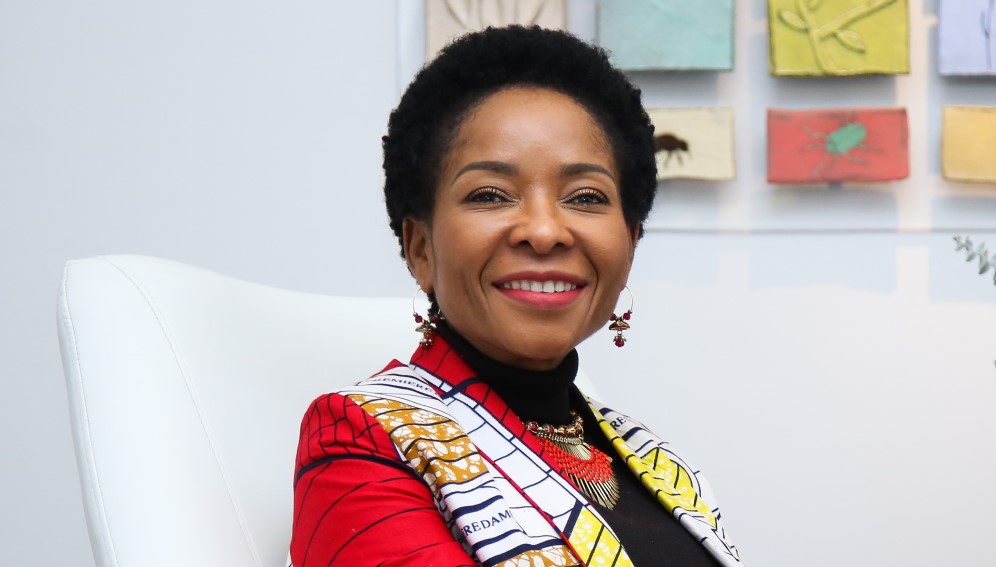Colourful, sometimes controversial, but never dull. Mamokgethi Phakeng is one of South Africa’s best-known university heads and a brilliant mathematician to boot.
Phakeng, who became the first black female to obtain a doctorate in mathematics education in 2002, started her term of office as vice-chancellor of the University of Cape Town in July 2018.
In October 2021, she was appointed as the first Illustrious Visiting Professor (BIVP) of the University of Bristol in England because of her “exceptional and inspirational” work in maths education. In 2019, Phakeng was awarded a doctorate of science from the university.
In the role, she will engage with the university’s academic community, participate in a public lecture series, and strengthen educational and research collaborations between the two universities.
Professor Mamokgethi Phakeng, Vice Chancellor, University of Cape Town. Credit: University of Cape Town.
Phakeng has a host of awards to her name, including the Order of the Baobab (Silver) from the South African Presidency in 2016 for her contribution to science on the international stage.
Childhood love of maths
Phakeng tells SciDev.Net that she developed a love for mathematics while growing up.
“I think I was in Grade 10 when my mother heard about a winter school in the area, and she sent me there. They were only doing mathematics,” she says.
“My school had a winter school for physics, a township school in Ga-Rankua. And it is here that they introduced us to geometry which sort of changed my mind about mathematics because suddenly it made sense.”
“After the holidays, I returned to Odi High School and was hooked on mathematics. It was something where I could predict how I was going to perform… So, I think that was the love that developed in this time. The teacher introduced the concepts that I grasped, the big idea and [I] gained confidence from there. I was 13.”
But Phakeng says the second thing that helped her get into mathematics was the influence of her parents. Her dad was the country’s first black broadcaster, while her mum was a school teacher.
“My parents never talked about mathematics [being] hard. There was never a hierarchy of subjects at home. There was only the demand that you [had to] do well. My dad had a demand to be excellent,” she recalls.
Phakeng says this protected her from the fear of maths. “Many children fear science because they’re told maths is tough. Many girls are scared of science because they’re told ‘girls don’t do maths. Whereas I didn’t know, so that naivety about mathematics helped.”
After matriculation, Phakeng enrolled for a Bachelor of Science degree at the University of Bophuthatswana (now the University of North-West). “I was performing well and feeling proud of myself,” she tells SciDev.Net.
Motivating young people
Phakeng believes young people should be made aware of the benefits of maths such as logical thinking and making sense of things around us, as well as the careers available to mathematicians.
“Many girls are scared of science because they’re told ‘girls don’t do maths. Whereas I didn’t know, so that naivety about mathematics helped.”
Mamokgethi Phakeng, University of Cape Town
“Many young people think that mathematics doesn’t mix with certain things. I mean, I put on makeup and do mathematics. So, I say to them that it is possible. And this is how you can make it possible. Every day, at least an hour, you do mathematics to practice what you’ve done before,” she says.
Her love for mathematics took her into a career in the non-governmental sector, working as a teacher in rural farm schools “with the most impoverished people” before she joined academia.
Now, a member of the board of the Oprah Winfrey Leadership Academy for Girls (OWLAG) in South Africa, girls and many others look up to her for inspiration. She is also a member of the board of the Geneva Science and Diplomacy Anticipator, a body that brings together different communities to jointly anticipate scientific and technological advancements and, based on them, develop inclusive and global solutions for a sustainable future.
The secret of her success as a maths teacher? “I have this philosophy that if you want children to do well in mathematics, you must make them love mathematics, and to make them love mathematics comes in how you teach it so that they can do it even when you’re not there,”
Her journey through academic institutions saw her work in a variety of roles before landing the vice-chancellor role at UCT, considered among the best on the African continent. Phakeng says her rating as a B1 scientist was necessary because “when you’re a black African woman, the assumption is that you are an affirmative action appointee”.
According to the National Research Foundation of South Africa, a researcher with B1 rating is one who “enjoys considerable international recognition for the high quality and impact of his or her recent research outputs, with some of them indicating that he or she is a leading international scholar in the field”.
“It’s been very important for me to tick every step, even to get the rating,” says Phakeng, because “there will always be doubting Thomases [who] question how capable you are… So, it’s essential that people can see what you have done. They can check your international reputation as a scholar, as a leader…the data and evidence of leadership and scholarship is there to be seen. I felt that it’s essential to do that as a black African.”
This piece was produced by SciDev.Net’s Sub-Saharan Africa English desk.




